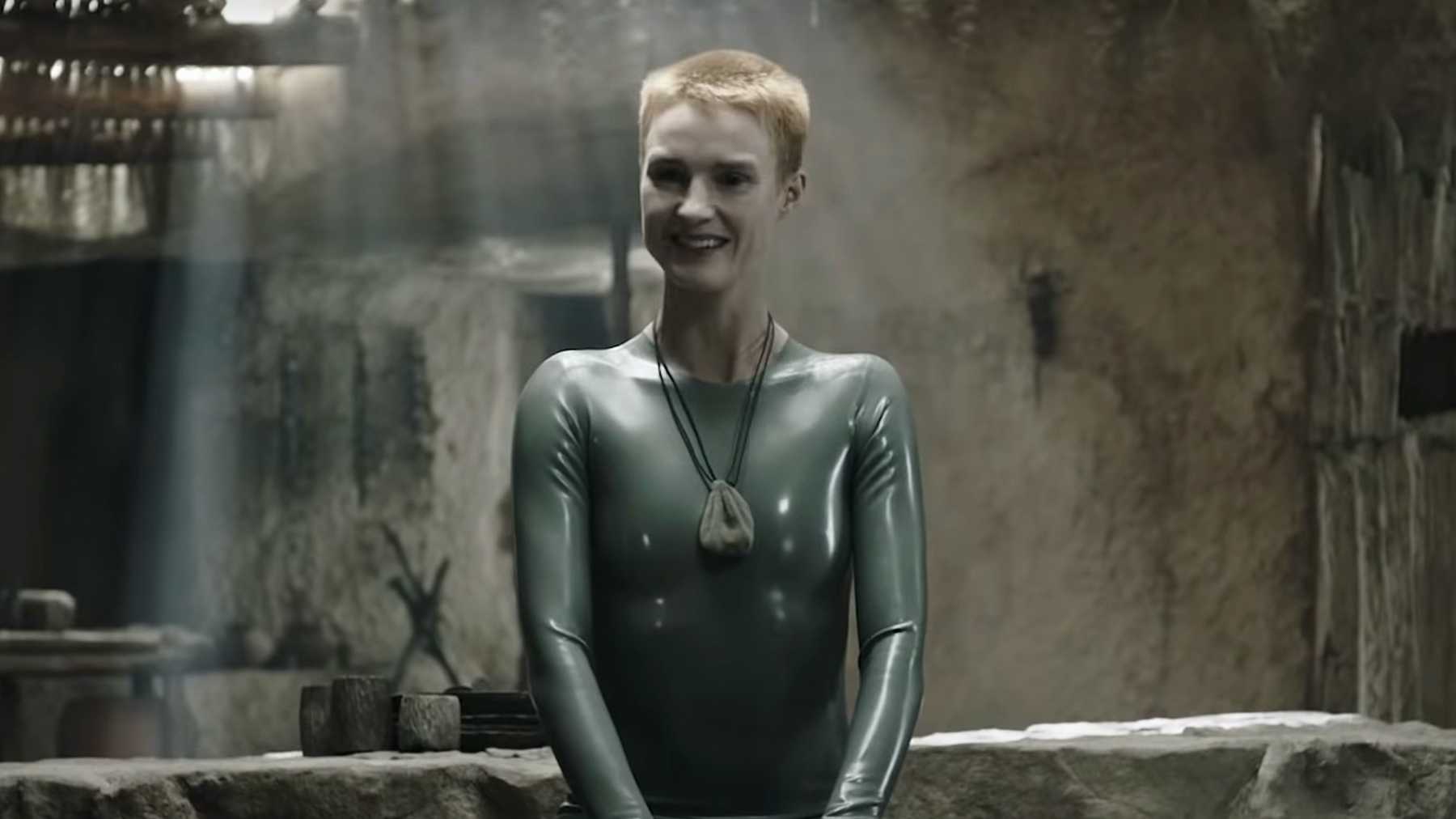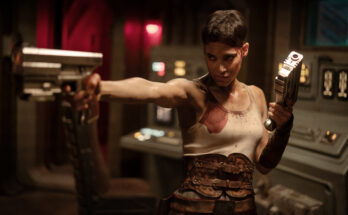Want to hear more from the actors and creators of your favorite shows and films? Subscribe to The Cinema Spot on YouTube for all of our upcoming interviews!
Managing editor & film and television critic with a Bachelor's of Arts in English Literature with a Writing Minor from the University of Guam. Currently in graduate school completing a Master's in English Literature.
“Think positively. Human beings are very hard to destroy.” Raised by Wolves‘s third episode is titled “Virtual Faith,” written by series creator Aaron Guzikowski and directed by Luke Scott, son of executive producer Ridley Scott.
Some minor spoilers ahead for those who have not yet seen this episode or the previous episodes of the series. If you have not done so, get to that now, then return to this article!
The last episode in this HBO Max show’s three-part series premiere sees Mother (Amanda Collin) investigating the Ark of Heaven crash site. Father (Abubakar Salim) watches over the spaceship’s surviving children Paul (Felix Jamieson), Vita (Ivy Wong), Holly (Aasiya Shah), Tempest (Jordan Loughran), and Hunter (Ethan Hazzard), but Campion (Winta McGrath) hatches a plan to escape from his adoptive android parents. Marcus Drusus (Travis Fimmel) joins his partner Sue (Niamh Algar) as they continue to adjust to having new human identities among the Mithraic passengers. What results from these subplots is a connected theme of endurance and persistence to survive in the new, yet unknown world.
Mother is weary she is unfit to perform the role of a matriarchal and is afraid to be the reason the children have been put in danger. Tempest and Hunter develop in their rough relationship as brother and sister figures, and yet Mother cannot resolve their conflict. Father wants the children to be safe and begins to believe that he has grown to become as real as a human being. He assures them that they will get through their sickness. He tells Paul, “Human beings are very hard to destroy.”
Marcus — formerly Caleb — is revealed to have more background information: He was trained by atheists since his youth to know only war, not peace, and to fight in the same manner as androids.
The episode incorporates old school tales and rituals. At the start, Mother tells the children that they can defend themselves from danger but only by preparation; however, Hunter argues otherwise, that they should flee. Mother tries to lift their spirits by telling them an intimidating version of the secular story, “The Three Little Pigs.” Hunter refuses to share her belief in what danger lurks outside their home, then goes so far as to label her the “big, bad wolf.” In flashbacks, Marcus and Sue stay positive in having Paul as their son. The former tries to have the boy befriend other Mithraic children, briefly starting a game of “Duck, Duck, Goose.” Later, in the present tense of the episode, Paul is separated from the others when they escape Mother and Father’s home, and he himself becomes the Goose, so to speak.
The multiple plots of “Virtual Faith” mirror the Bible’s Book of Exodus, particularly Moses and the freed people’s expedition into the Promised Land, in this case, the extrasolar planet Kepler-22b. A member of the Mithraic survivors, Lucius (Matias Varela), tells Marcus, “Beneath the Promised Land will be demons. When the light is shone upon them, they shall be like us.” Similarly, Campion attempts to free himself and the children from being enslaved by the ruling figures, that is, his parents. When Mother and Father gradually lose their trust in him as he distances himself from them, Father tells him, “You betrayed my trust, made me look like a fool. If I cannot adequately care for you and the other children, I am of no use to the family. I need to be of use, do you understand?” He is trying to be not only the father figure of the family but the Father figure as well. Just like in the previous episode, Father wants to be the godlike individual that the children will look toward and love. In juxtaposition with this, Campion tells the children that Mother has no love for them. He says, “Her love isn’t real … [She] can make you see things when she wants to scare you.”
Additionally, the cinematography proves good, such as when Campion’s former sibling Tally’s tombstone is foregrounded into the frame in one scene, with Mother as the focal point but in the background. This may confirm that the androids put the human children first but at their own personal interest.
This third episode of Raised by Wolves continues to excel with its Biblical parallels and old school practices. It can also be worthy of praise for its theme of optimism. A Mithraic member makes a good point when she says, “We must master happiness now.” Paul shows his parents a model of his ideal “city of peace, where only good things happen”; and Mother tells her children that “stories can be great fun, and they can help simplify complicated conflict.” Although the characters of this episode undergo some hardship, they also remember to be positive in these tough times; and what better to remind ourselves of this than now!
What do you think of the series so far? Have you seen the show yet? Let us know! For more science-fiction, drama, HBO Max, and Raised by Wolves-related news and reviews follow The Cinema Spot on Twitter (@TheCinemaSpot) and Instagram (@thecinemaspot_).
Managing editor & film and television critic with a Bachelor's of Arts in English Literature with a Writing Minor from the University of Guam. Currently in graduate school completing a Master's in English Literature.






2 Comments on “‘Raised By Wolves’ S01E03 Review – “Virtual Faith””